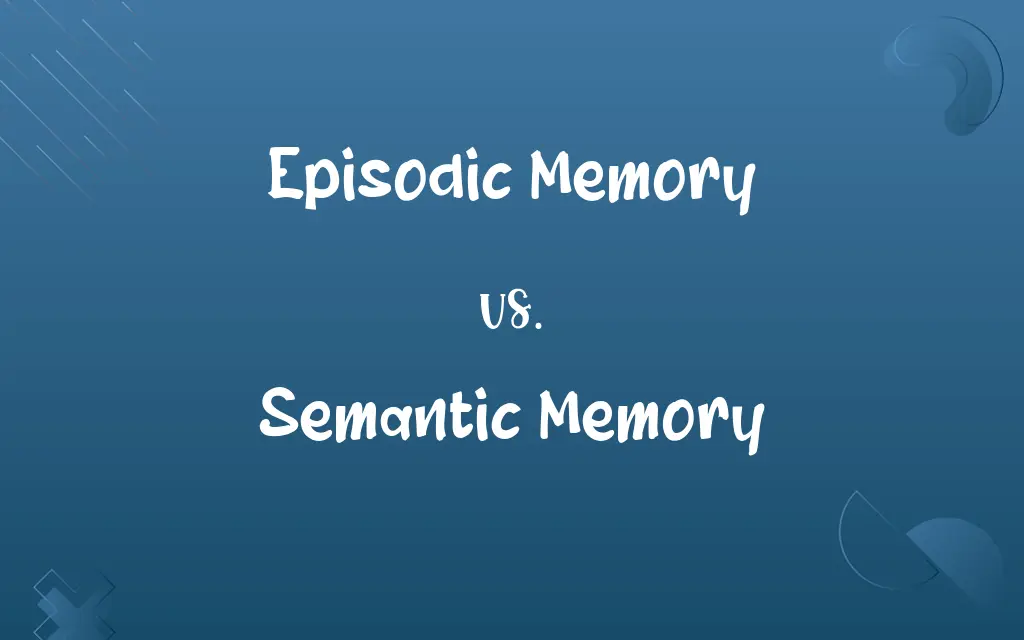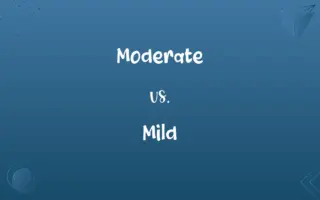Episodic Memory vs. Semantic Memory: Know the Difference

By Shumaila Saeed || Updated on December 25, 2023
Episodic memory stores personal experiences and specific events, whereas semantic memory holds general knowledge and facts unrelated to personal experiences.

Key Differences
Episodic memory is a type of long-term memory that captures personal experiences and specific events, including context like time and place. In contrast, semantic memory is concerned with facts, concepts, and knowledge that are general and not tied to personal experiences.
Shumaila Saeed
Dec 19, 2023
Episodic memory allows individuals to recall past personal experiences, such as a childhood birthday party. Semantic memory, on the other hand, involves the recall of general knowledge, like the capital of a country, independent of personal experience.
Shumaila Saeed
Dec 19, 2023
The formation of episodic memories often involves a higher degree of emotional involvement, as they are directly tied to personal experiences. Semantic memory, while it can be influenced by personal experiences, primarily deals with objective, emotion-neutral content.
Shumaila Saeed
Dec 19, 2023
Episodic memory plays a key role in forming personal identity, as it is composed of the narrative of an individual’s life. Semantic memory contributes to our understanding of the world and language, enabling us to comprehend and use abstract concepts.
Shumaila Saeed
Dec 19, 2023
The retrieval process in episodic memory is often more complex and is subject to distortions over time, as it involves reconstructing past experiences. Semantic memory retrieval is typically more straightforward and stable, focusing on factual information.
Shumaila Saeed
Dec 19, 2023
ADVERTISEMENT
Comparison Chart
Type of Information
Personal experiences and specific events
General knowledge and facts
Shumaila Saeed
Dec 19, 2023
Role in Identity
Forms personal narrative
Contributes to general understanding
Shumaila Saeed
Dec 19, 2023
Stability and Retrieval
Subject to distortion, complex retrieval
More stable, straightforward retrieval
Shumaila Saeed
Dec 19, 2023
ADVERTISEMENT
Episodic Memory and Semantic Memory Definitions
Episodic Memory
Long-term memory of life events.
My grandfather has a rich episodic memory of his life’s adventures.
Shumaila Saeed
Dec 09, 2023
Semantic Memory
Recollection of conceptual and factual information.
He relies on his semantic memory for his expertise in science trivia.
Shumaila Saeed
Dec 09, 2023
Episodic Memory
A type of memory where personal experiences are re-experienced.
Whenever I smell pine trees, my episodic memory takes me back to childhood camping trips.
Shumaila Saeed
Dec 09, 2023
Semantic Memory
A type of long-term memory for understanding the world.
Semantic memory helps us comprehend concepts like gravity and time.
Shumaila Saeed
Dec 09, 2023
Episodic Memory
Memory of personal experiences.
I vividly recall my first day of school, a clear episodic memory.
Shumaila Saeed
Dec 09, 2023
ADVERTISEMENT
Semantic Memory
Memory of meanings, understandings, and other concept-based knowledge.
Teachers rely heavily on their semantic memory to convey complex ideas.
Shumaila Saeed
Dec 09, 2023
Episodic Memory
Memory that includes contextual details like time and place.
His episodic memory of the concert includes not just the music, but also the ambience and weather.
Shumaila Saeed
Dec 09, 2023
Semantic Memory
Memory of facts and general knowledge.
Her semantic memory is impressive, especially her grasp of historical dates.
Shumaila Saeed
Dec 09, 2023
Episodic Memory
Recollection of specific events in one's life.
Her episodic memory of her wedding day is incredibly detailed.
Shumaila Saeed
Dec 09, 2023
Semantic Memory
Memory independent of personal experience and emotion.
Languages are learned and stored in our semantic memory.
Shumaila Saeed
Dec 09, 2023
Repeatedly Asked Queries
What is Episodic Memory?
It’s the memory of personal experiences and events.
Shumaila Saeed
Dec 19, 2023
Are emotions involved in Episodic Memory?
Yes, often they are emotionally charged.
Shumaila Saeed
Dec 19, 2023
How do Episodic and Semantic Memory differ in content?
Episodic is about personal events, Semantic is about general knowledge.
Shumaila Saeed
Dec 19, 2023
Is context important in Episodic Memory?
Yes, it includes contextual details like time and place.
Shumaila Saeed
Dec 19, 2023
Does Episodic Memory contribute to personal identity?
Yes, it forms our personal narrative.
Shumaila Saeed
Dec 19, 2023
How is Semantic Memory acquired?
Through learning and absorbing facts and concepts.
Shumaila Saeed
Dec 19, 2023
Can Episodic Memory change over time?
Yes, it can be subject to distortions.
Shumaila Saeed
Dec 19, 2023
How stable is Semantic Memory?
It’s relatively stable and less prone to distortion.
Shumaila Saeed
Dec 19, 2023
What role does Semantic Memory play in cognition?
It aids in understanding and using language and concepts.
Shumaila Saeed
Dec 19, 2023
What is an example of Episodic Memory?
Remembering your last birthday celebration.
Shumaila Saeed
Dec 19, 2023
Is one type of memory more important than the other?
Both are crucial for different aspects of cognition and behavior.
Shumaila Saeed
Dec 19, 2023
Do both types of memory work together?
Yes, they often interact and complement each other.
Shumaila Saeed
Dec 19, 2023
Can Episodic Memory become Semantic Memory?
Over time, some episodic memories can be generalized into semantic knowledge.
Shumaila Saeed
Dec 19, 2023
Is Semantic Memory affected by aging?
It can be, but generally less than Episodic Memory.
Shumaila Saeed
Dec 19, 2023
Give an example of Semantic Memory.
Knowing the capital of France is Paris.
Shumaila Saeed
Dec 19, 2023
How do we acquire Episodic Memory?
Through personal experiences and events.
Shumaila Saeed
Dec 19, 2023
Can you lose Episodic Memory?
Yes, due to aging or disorders like Alzheimer’s.
Shumaila Saeed
Dec 19, 2023
Share this page
Link for your blog / website
HTML
Link to share via messenger
About Author
Written by
Shumaila SaeedShumaila Saeed, an expert content creator with 6 years of experience, specializes in distilling complex topics into easily digestible comparisons, shining a light on the nuances that both inform and educate readers with clarity and accuracy.































































